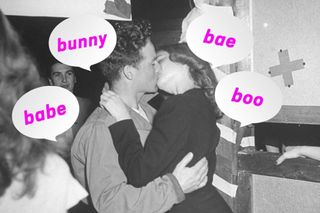
The Psychology Behind Romantic Pet Names and Baby Talk
It’s Freudian, pumpkin.

Let’s be honest: pet names coined by couples for each other can be rather nauseating. Think: “sweetums,” “sugar lips,” “angel face,” “love muffin,” “cutie patootie” and several Google pages-worth of ridiculously infantilizing suggestions, including — and this is the worst, arguably — “pumpkiny wumpkiny.” What’s worse is that these names are often accompanied by a timbre mostly used to communicate with babies.
Yet, despite my haughtiness about people in love being sickeningly and moronically mushy, I, too, find myself slipping into a pattern of calling my significant others (when I have them) “babe,” “darling,” and even — “baby.” It eventually becomes so ingrained that the only time I use their real names in my real adult voice is when they’ve done something to piss me off and they have another thing coming. In fact, that’s how they usually get to know they’ve messed up. What is it then, about baby-talk in general, and pet names in specific, that they inevitably become mainstays in most adult romantic relationships, especially in earlier stages of the relationship?
Turns out, it’s probably about your mother and your childhood, as most things in psychology are.
“Baby talk is used really extensively, including cross-culturally, by mothers around the world,” Dean Falk, a Florida State University neuroanthropologist and specialist in the origins of human language development, told Broadly. She explains that baby talk — universally used between babies and caregivers, mostly mothers — not only facilitates language acquisition skills in babies, it also fosters an emotional bond between infants to their mothers. Linguistic research goes on to suggest that baby talk plays a similar role in couples: using baby talk and infantilizing, mushy pet names solidifies mutual attachment between the partners. The communication intentions behind baby-talk and the usage of pet names in relationships parallel the hallmarks of intimacy — affection and play — thereby facilitating psychological attachment. “My hypothesis is an extremely simple one,” Falk explained to Broadly. “Couples, speaking this way, harken back to their own experience when they were infants and to their first love, their mother.”
This probably also explains why pet names with the letters b or p, such as “baby” and “sweetie pie” are more common than “angel.” “Commonly, when babies begin acquiring language, they use the vowel ‘a,’ and consonants like ‘p,’ ‘b,’ and, ‘m’ because they are bilabial sounds caused by the closure or near closure of the lips] and the easiest to pronounce,” Frank Nussel, a linguistics expert at the University of Louisville, told Broadly. In another interview with Good Housekeeping, he explains: “When parents, and usually it’s the mother who interacts the most, tries to teach the baby language, they use the terms of the child: mama, papa, baba. Then the adults transfer the language to other adults or significant others in their life, and they use those as terms of endearment.”
In 2018, Linda Polka, a professor at McGill University’s School of Communication Disorders, conducted a study on Infant-Directed Speech or the particular sounds and timbre parents use to talk to babies, and concluded in a press release: “Perhaps, when we use a high, infant-like voice pitch to speak to our babies, we are actually preparing them to perceive their own voice.” This, Polka suggests, in an intuitive knowledge in caregivers.
Related on The Swaddle:
Couples Who Say ‘We’ Instead of ‘I’ May Be Obnoxious — But They’re Also More Solid
But pet names and baby talk between couples are more than just about endearment. If we consider some linguists’ belief that a couple’s private language is what forms the basis of the relationship, then it is easy to see how baby-talk fills in the intimate space in a new relationship, where the language is less about sharing information, and more about conveying affection and seeking reassurance. Hearing someone call you “precious,” or “beautiful,” as a pet name can be eye-roll-inducing, yes. But if one needs or wants someone to think of them as precious or beautiful without the interference or judgment of the outside world, being called by those pet names can feel extremely gratifying and intimate.
Baby talk, pet names, inside jokes, even witty banter, and teasing — these linguistic devices help couples create a private world just for two, free from the exhausting realities of adulthood and distinct from other adult relationships. In a frequently cited 1993 study published in the Journal of Social and Personal Relationships, The Ohio State University researchers Carol Bruess and Judy Pearson found that couples who used more private language, or “idiosyncratic communication,” reported higher levels of relationship satisfaction.
But why baby talk, of all things? One study that examined the context of diminutives found words such as “baby,” “sweet pea,” “cutie pie” conveyed pragmatic senses such as smallness, cuteness, and silliness — all things that require vulnerability. Therefore, while it may be easy for outsiders to laugh at baby-talk between a couple, for two people willing to put their very-adult-guards down and engage in such talk, it can actually strengthen relationship security. “There are seven basic emotional systems — including rage, fear, care, and play — that all animals have; it’s how we’ve been evolutionarily wired,” Dr. Nan Wise, a psychotherapist, told Broadly. “When we’re young, all animals learn by play,” she explains. “These social connections are critical for wellbeing. So using baby talk to each other is a way of facilitating these innate bonding systems of play, and care.”
In today’s digital age — where nothing is private anymore, casual relationships thrive with the advent of dating apps, and people are most distanced than ever — having a pet name, a particular timbre of voice, a particular mannerism that suggests a vulnerability in a relationship, becomes all the more valuable. Calling someone your baby, then, distinguishes them as being worthy of real intimacy as opposed to the many virtual intimacies we feign.
To sum it up, baby talk and pet names are strangely Freudian and good for relationships, as long as they’re kept private (please, save us the torture) and both partners feel respected and loved and agree to all the terms of endearment.
Pallavi Prasad is The Swaddle's Features Editor. When she isn't fighting for gender justice and being righteous, you can find her dabbling in street and sports photography, reading philosophy, drowning in green tea, and procrastinating on doing the dishes.
Related


The NoFap Movement: Why People Are Abstaining From Masturbation
